Đề thi vào 10 chuyên Tiếng Anh trường THPT Chuyên Hưng Yên chính thức (2022) có đáp án
Đề thi vào 10 chuyên Tiếng Anh trường THPT Chuyên Hưng Yên chính thức (2022 + các năm) có đáp án chi tiết giúp học sinh ôn luyện để đạt điểm cao trong kì thi tuyển sinh vào lớp 10. Mời các bạn cùng đón xem:
Chỉ từ 100k mua trọn bộ Đề thi vào 10 môn Tiếng Anh bản word có lời giải chi tiết:
B1: Gửi phí vào tài khoản 0711000255837 - NGUYEN THANH TUYEN - Ngân hàng Vietcombank (QR)
B2: Nhắn tin tới zalo Vietjack Official - nhấn vào đây để thông báo và nhận giáo án.
Xem thử tài liệu tại đây: Link tài liệu
Đề thi vào 10 chuyên Tiếng Anh trường THPT Chuyên Hưng Yên chính thức (2022 + các năm) có đáp án
Đề thi vào 10 chuyên Tiếng Anh trường THPT Chuyên Hưng Yên - 2022
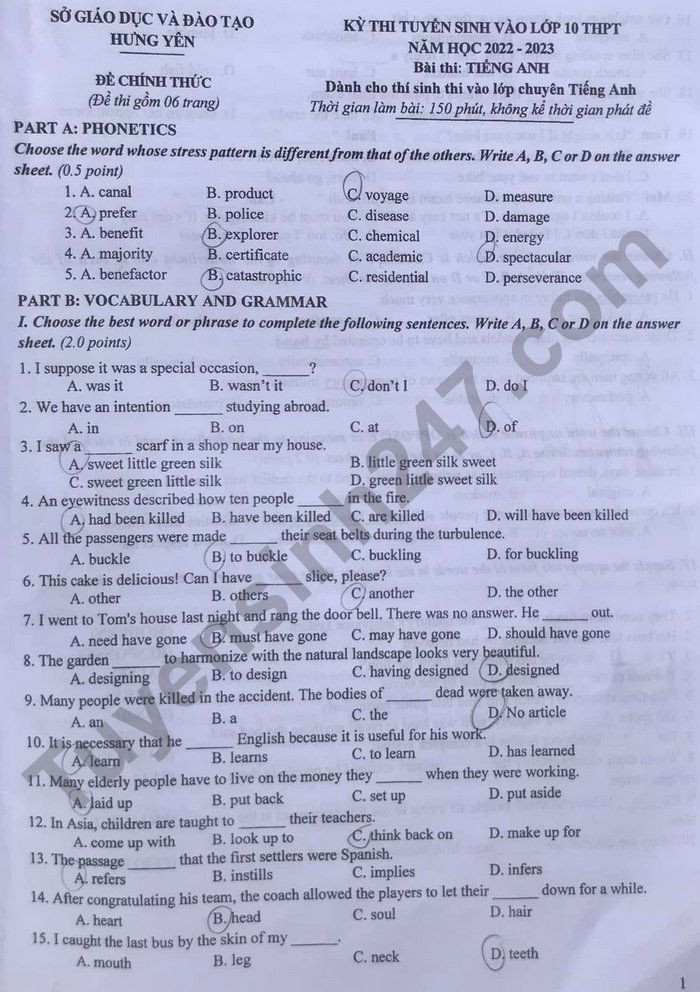
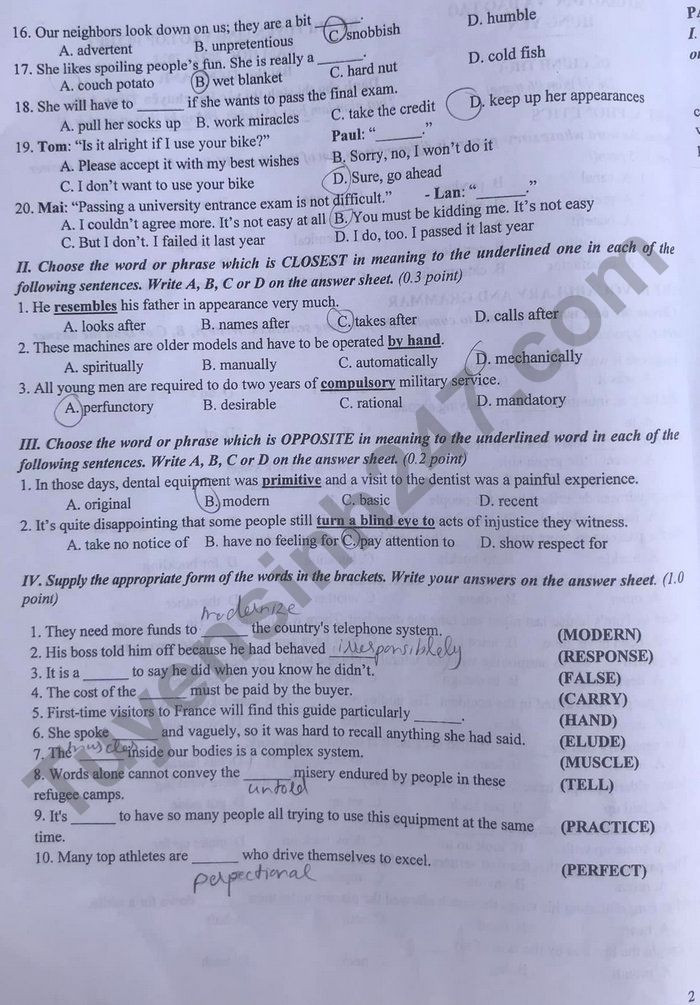

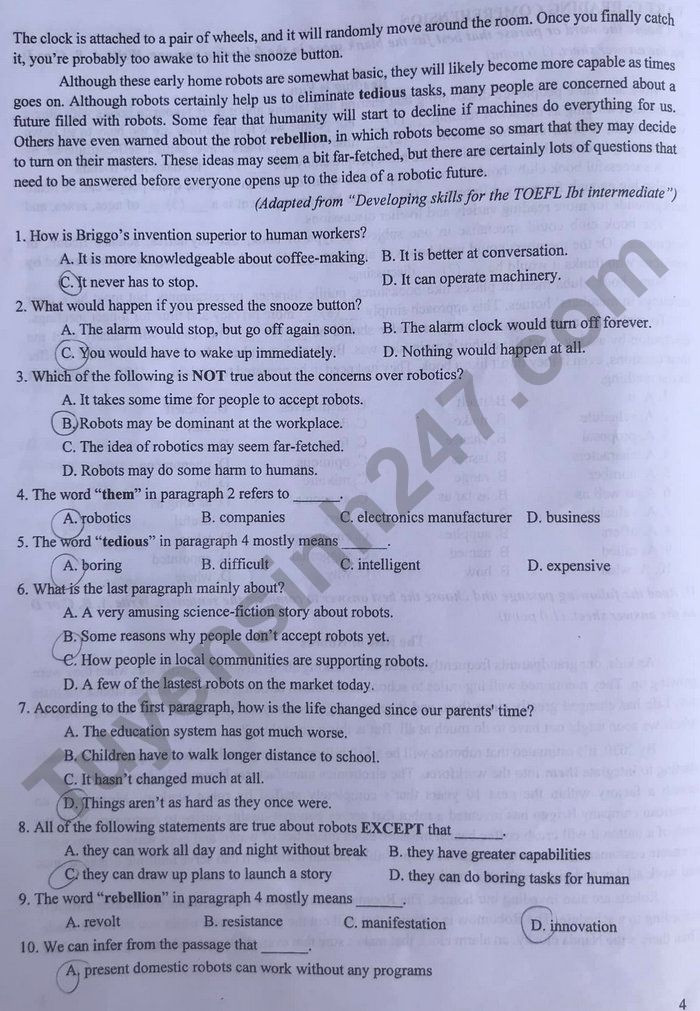
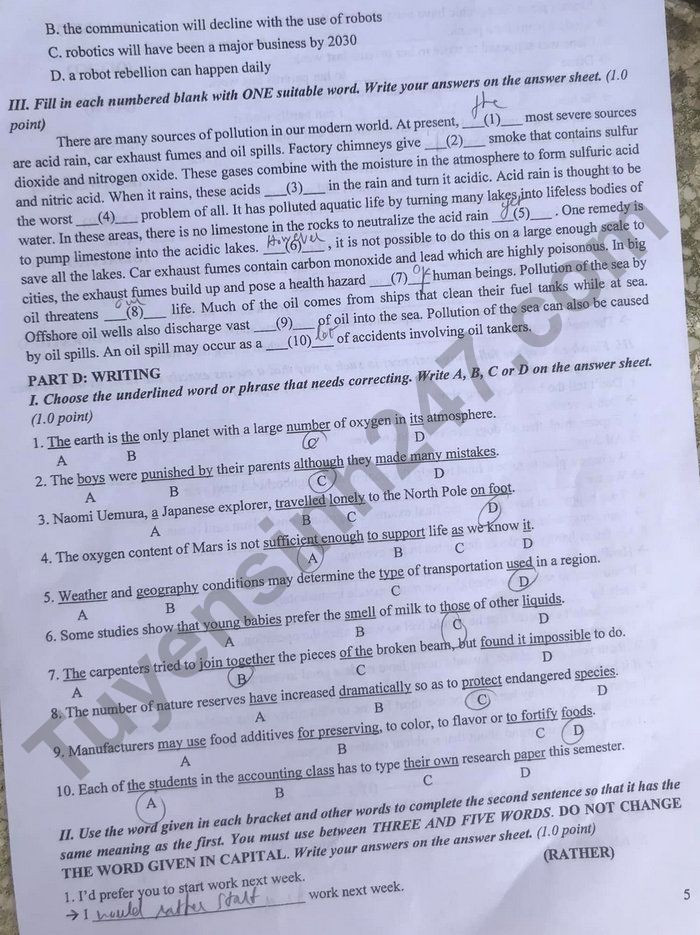
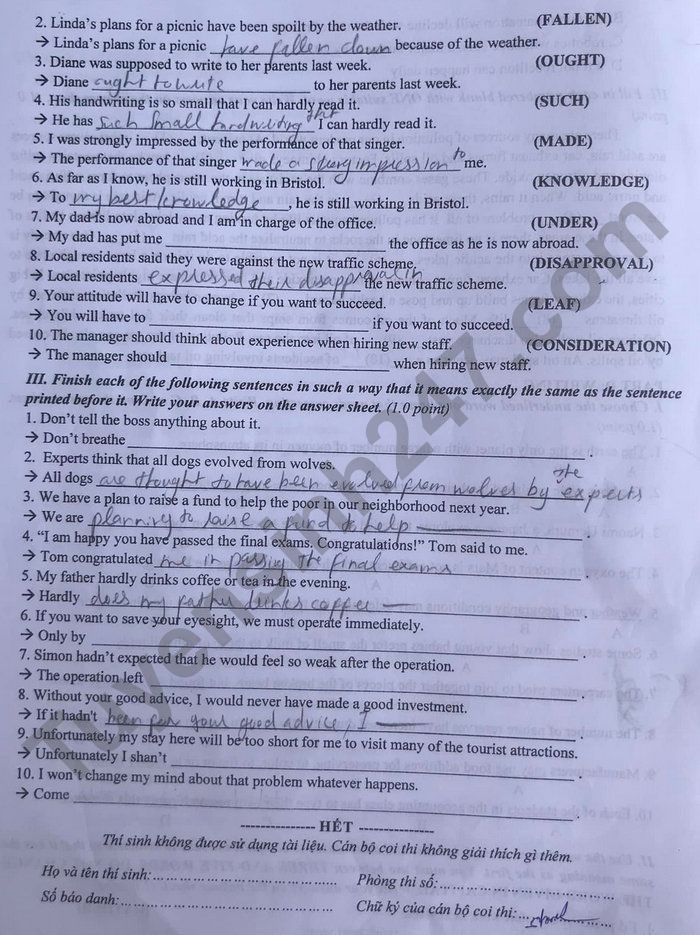
Đề thi vào 10 chuyên Tiếng Anh trường THPT Chuyên Hưng Yên - 2021
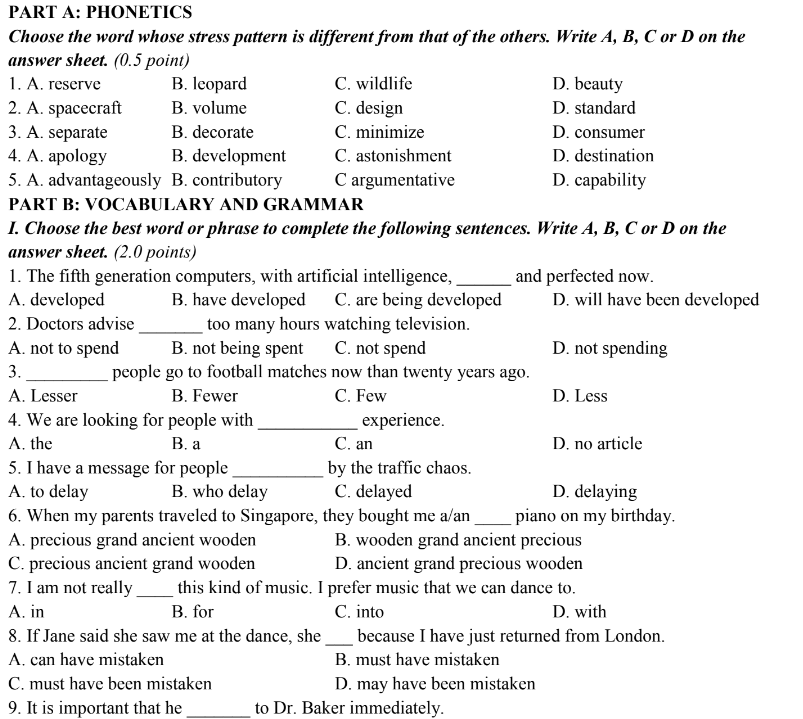


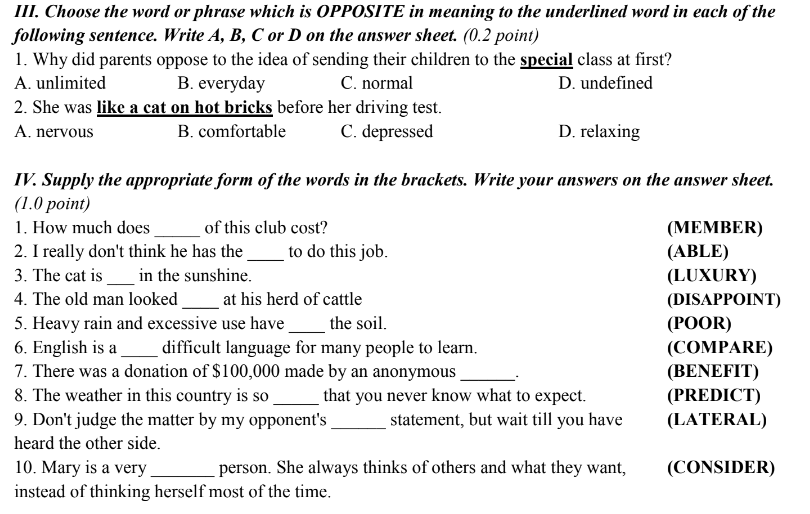
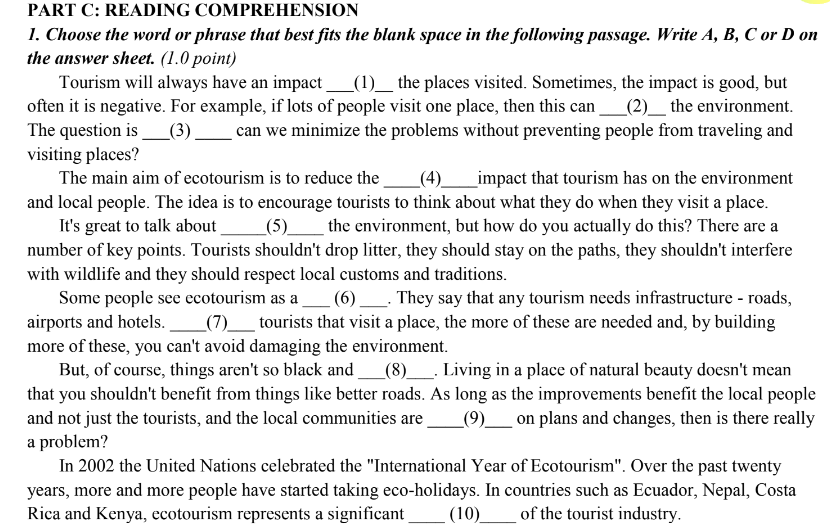
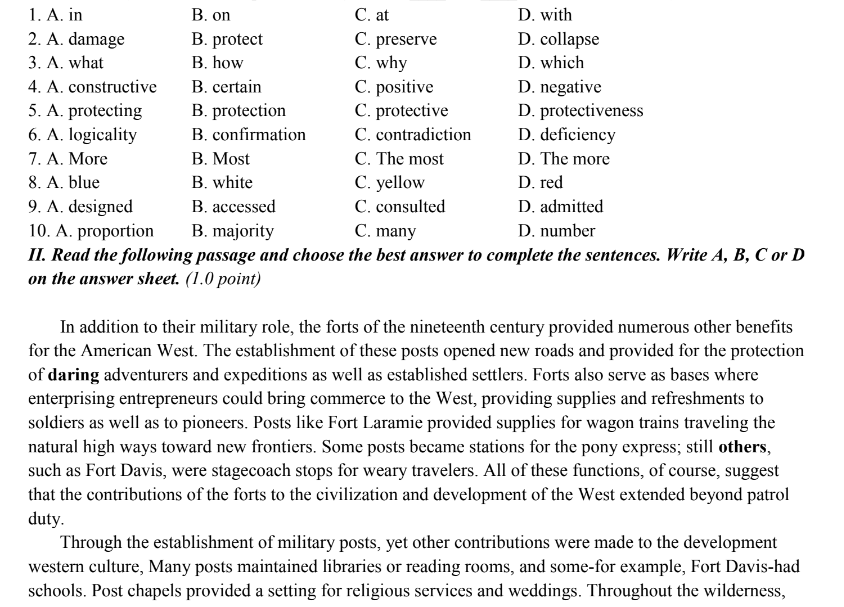
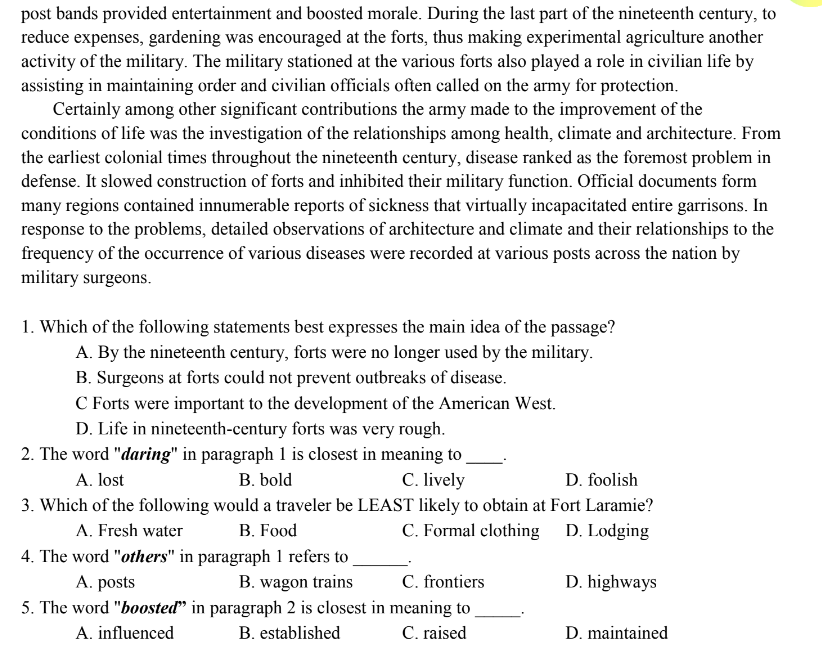
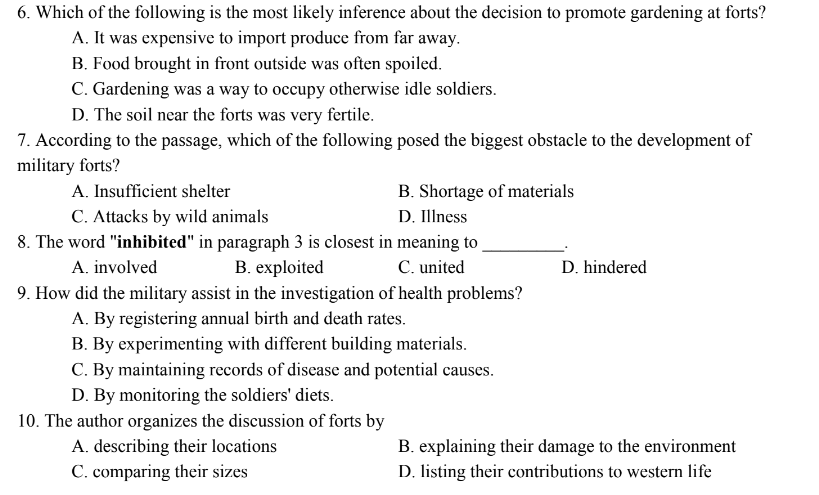
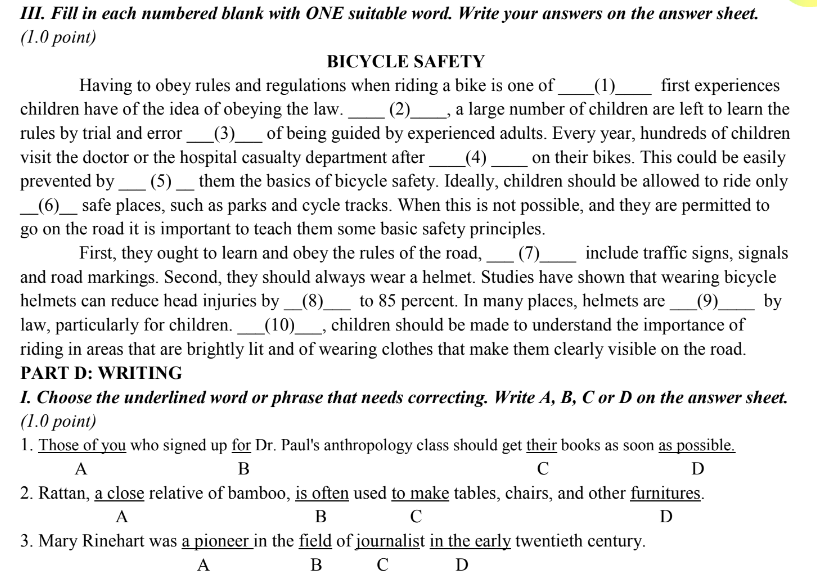

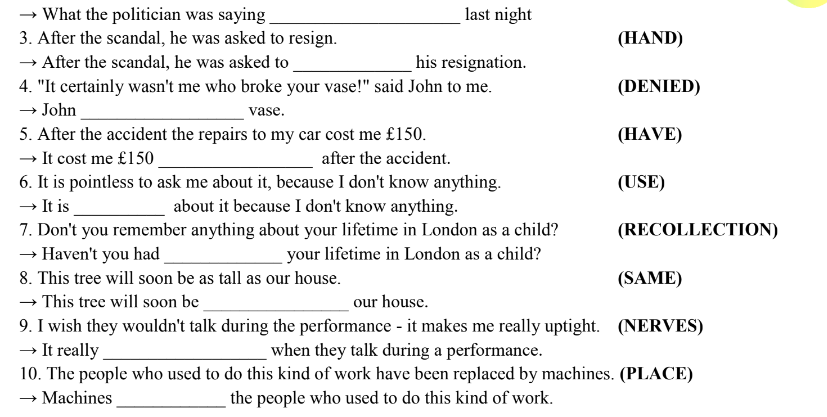
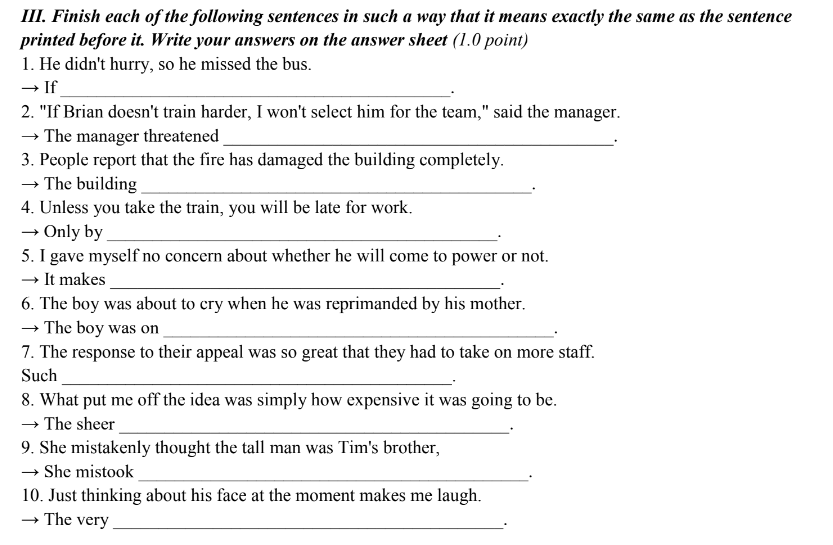
ĐÁP ÁN - THANG ĐIỂM
PART A: PHONETICS
Choose the word whose stress pattern is different from that of the others. Write A, B, C or D on the answer sheet. (0.5 point)
1. A. reserve B. leopard C. wildlife D. beauty
2. A. spacecraft B. volume C. design D. standard
3. A. separate B. decorate C. minimize D. consumer
4. A. apology B. development C. astonishment D. destination
5. A. advantageously B. contributory C argumentative D. capability
| 1. A. re’serve B. ‘leopard C. ‘wildlife D. ‘beauty 2. A. ‘spacecraft B. ‘volume C. de’sign D. ‘standard 3. A. ‘separate B. ‘decorate C. ‘minimize D. con’sumer 4. A. a’pology B. de’velopment C. as’tonishment D. desti’nation 5. A. ,advan’tageously B. con’tributory C. ,argu’mentative D. ,capa’bility |
I. Choose the best word or phrase to complete the following sentences. Write A, B, C or D on the answer sheet. (2.0 points)
1. The fifth generation computers, with artificial intelligence, ______ and perfected now.
A. developed
B. have developed
C. are being developed
D. will have been developed
| Sự hòa hợp chủ vị: S1, with/as well as/together with/along with/accompanied by S2, V chia theo S1 Trạng từ chỉ thời gian: now -> Thì hiện tại tiếp diễnBị động: be + being + PII |
2. Doctors advise _______ too many hours watching television.
A. not to spend
B. not being spent
C. not spend
D. not spending
• advise doing sth: khuyên làm gì
• advise sbd to do sth: khuyên ai đó làm gì
3. _________ people go to football matches now than twenty years ago.
A. Lesser
B. Fewer
C. Few
D. Less
• than => cấu trúc so sánh => loại đáp án C, D
• people là N đếm được, chỉ người => Chọn B. Fewer + N đếm được số nhiều
4. We are looking for people with ___________ experience.
A. the
B. a
C. an
D. no article
• experience là danh từ không đếm được -> không sử dụng a, an.
• Không đề cập đến kinh nghiệm cụ thể nào trước đó -> không sử dụng the
5. I have a message for people __________ by the traffic chaos.
A. to delay
B. who delay
C. delayed
D. delaying
Mệnh đề quan hệ dạng rút gọn cho bị động: delayed = who are delayed
6. When my parents traveled to Singapore, they bought me a/an ____ piano on my birthday.
A. precious grand ancient wooden
B. wooden grand ancient precious
C. precious ancient grand wooden
D. ancient grand precious wooden
OPSACOMP
Opinion: precious (a): quý giá => Size: grand (a): rất lớn => Age: ancient (a): cổ => Material: wooden (a): bằng gỗ
7. I am not really ____ this kind of music. I prefer music that we can dance to.
A. in
B. for
C. into
D. with
be into sth: rất quan tâm, thích thú đến điều gì đó
8. If Jane said she saw me at the dance, she ___ because I have just returned from London.
A. can have mistaken
B. must have mistaken
C. must have been mistaken
D. may have been mistaken
Câu điều kiện loại 3
Must have + PII: hẳn là đã, dùng để chỉ sự suy luận hợp lý trong quá khứ, dùng để diễn tả một việc gì đó trong quá khứ mà người nói gần như biết chắc
9. It is important that he _______ to Dr. Baker immediately.
A. speak
B. spoke
C. will speak
D. speaks
Subjunctive: It is important/vital/crucial/necessary/mandatory/compulsory/… that + S + Vinfi
10. Jane likes watching films, but she is not ________ keen on any kind.
A. specially
B. certainly
C. largely
D. particularly
particularly (adv): cụ thể => không thích cụ thể loại phim nào cả
11. It’s rather difficult to distinguish the two pictures. They are almost ____
A. like
B. same
C. as
D. alike
be alike = be similar to: giống
12. The doctor told Tom that too much _____ to the sun is bad for the skin.
A. exposure
B. extension
C. exhibition
D. expansion
exposure to sth (N): tiếp xúc, phơi nhiễm với cái gf
13. If you want a good flat in London, you have to pay through the _____ for it.
A. mouth
B. ear
C. nose
D. teeth
pay through the nose: trả quá nhiều tiền cho một thứ gì đó
14. As the President was absent, I was asked to ____ the meeting.
A. officiate
B. chair
C. govern
D. regulate
officiate: phụ trách hoặc dẫn dắt một buổi lễ hoặc sự kiện công cộng khác
chair: trở thành người phụ trách cuộc họp (hay đi với the meeting)
govern: kiểm soát và quản lý một quốc gia, thành phố, nhóm người, v.v
regulate: kiểm soát một cái gì đó, đặc biệt là bằng cách làm cho nó hoạt động theo một cách cụ thể
15. Many of these were accepted during compromise negotiations, _______ tighter regulations than originally proposed.
A. taking over
B. resulting in
C. holding on
D. keeping to
take over sth: có được quyền kiểm soát một cái gì đó hoặc thay thế ai đó, tiếp quản, kế tục, nổi nghiệp, tiếp tục
result in sth: dẫn đến, đưa đến, kết quả là
hold on: nắm chặt, giữ chặt, bám chặt
keep to sth: làm những gì bạn đã hứa hoặc dự định làm
16. She _____ modern art. She visits all the local exhibitions.
A goes in for
B. looks down on
C. fixes up with
D. comes up against
go in for sth: làm điều gì đó thường xuyên, hoặc thích hay tận hưởng điều gì đó
look down on sb: coi thường ai đó, nghĩ rằng bạn giỏi hơn ai đó
fix up sth: sửa chữa, trang trí hoặc thay đổi thứ gì đó để nó sử dụng được
come up against sth: phải đối phó với một vấn đề
17. We regret to inform you that the materials you ordered are _____.
A. out of work
B. out of reach
C. out of stock
D. out of practice
out of work: thất nghiệp
out of reach: ngoài khả năng, ngoài tầm với
out of stock: hết hàng
out of practice: không có thời gian luyện tập
18. An area of political unrest or danger is called _____.
A. a hot seat
B. a hot line
C. a hot spot
D. a hot potato
hot seat: ghế nóng => tình huống phải chịu trách nhiệm đưa ra những quyết định khó khăn mà mọi người, thường là nhân viên, có thể không thích
hot line: đường dây nóng
hot spot: điểm nóng, nơi có khả năng xảy ra chiến tranh hoặc các cuộc giao tranh khác
hot potato: một củ khoai tây nóng, một tình huống nhạy cảm hay vấn đề gây tranh cãi, khó giải quyết
Dịch: Một khu vực bất ổn chính trị hoặc nguy hiểm được gọi là một hot spot
19. Tom: “We’ll have to hurry if we want to finish this project on time.” – Nick: “______”
A. OK. But I’ll call you later.
B. I’ll say we will
C. I’m tired. I’ll go home early.
D. What a wonderful idea!
I’ll say: đồng ý mạnh mẽ với ý kiến được nêu ra
OK. But I’ll call you later: OK. Nhưng tôi sẽ gọi cho bạn sau
I’ll say we will: Tôi đồng ý chúng ta sẽ phải như vậy
I’m tired. I’ll go home early: Tôi bị mệt. Tôi sẽ về nhà sớm
What a wonderful idea!: Một ý tưởng thật tuyệt vời làm sao!
Dịch: “Chúng ta sẽ phải nhanh chóng nếu chúng ta muốn hoàn thành dự án này đúng hạn.” – “Tôi đồng ý chúng ta sẽ phải như vậy”
20. Kate was busy doing the washing up. Ann offered to help her, but she refused politely.
Ann: “Do you need any help?” – Kate: “______”
A. That’s fine by me
B. I haven’t got a clue
C. No, thanks. I can manage
D. That’s all for now
That’s fine by me: Đối với tôi vậy là tốt rồi
I haven’t got a clue: Tôi không có manh mối, Tôi không biết
No, thanks. I can manage: Không, cảm ơn. Tôi có thể tự lo liệu được
That’s all for now: Đó là tất cả cho bây giờ
II. Choose the word or phrase which is CLOSEST in meaning to the underlined one in each of the following sentence. Write A, B, C or D on the answer sheet. (0.3 point)
1. I knew he was only flattering me because he wanted to borrow some money.
A. teasing B. threatening C. praising D. elevating
flattering sbd: tâng bốc ai = praising sb: ca ngợi
2. The captain ordered the soldiers to gather on the double even though they were sleeping.
A. gradually B. immediately C. slowly D. gently
at/on the double: rất nhanh chóng và không có bất kỳ sự chậm trễ nào
3. We decided to pay for the furniture on the installment plan.
A. monthly payment B. cash and carry C. credit card D. piece by piece
installment: trả góp
monthly payment: trả góp hàng tháng
cash and carry: bán buôn
credit card: thẻ tín dụng
piece by piece: từng miếng một, từ từ, chậm rãi
III. Choose the word or phrase which is OPPOSITE in meaning to the underlined word in each of the following sentence. Write A, B, C or D on the answer sheet. (0.2 point)
1. Why did parents oppose to the idea of sending their children to the special class at first?
A. unlimited B. everyday C. normal D. undefined
special: đặc biệt
unlimited: không giới hạn
everyday: bình thường, điển hình, thông thường như thường ngày
normal: bình thường
undefined: chưa xác định
2. She was like a cat on hot bricks before her driving test.
A. nervous B. comfortable C. depressed D. relaxing
like a cat on hot bricks = like a cat on a hot tin roof: rất lo lắng, căng thẳng
IV. Supply the appropriate form of the words in the brackets. Write your answers on the answer sheet. (1.0 point)
1. How much does __membership___ of this club cost? (MEMBER)
member (N): thành viên -> membership (N): tư cách hội viên
2. I really don’t think he has the __ability__ to do this job. (ABLE)
have the ability to: có khả năng làm gì
3. The cat is __luxuriating_ in the sunshine. (LUXURY)
luxuriate in: hưởng thụ, vui hưởng; đắm mình vào; thích, ham
4. The old man looked __disappointedly__ at his herd of cattle (DISAPPOINT)
disappoint (V): làm cho ai thất vọng -> disappointedly (adv): một cách thất vọng, tính chất của hành động “The man looked”
The man looked disappointedly at: Người đàn ông nhìn một cách thất vọng vào
Lưu ý: câu này không dùng disappointed vì The man look disappointed là vẻ ngoài, disappointed là tính chất của danh từ the man: ông lão có vẻ thất vọng
5. Heavy rain and excessive use have __impoverished__ the soil. (POOR)
poor (a): nghèo -> impoverished (V): làm cho cái gì đó nghèo đi
6. English is a _comparatively___ difficult language for many people to learn. (COMPARE)
compare (V): so sánh -> comparatively (a): khá
7. There was a donation of $100,000 made by an anonymous _benefactor___. (BENEFIT)
benefit (N): lợi ích -> benefactor (N): người cho tiền hoặc giúp đỡ một trường học, bệnh viện, hội từ thiện; người hảo tâm
8. The weather in this country is so __unpredictable___ that you never know what to expect. (PREDICT)
predict (V): dự đoán -> unpredictable (a): không dự đoán được
9. Don’t judge the matter by my opponent’s ___unilateral___ statement, but wait till you have heard the other side. (LATERAL)
lateral (a): ở bên -> unilateral (a): một bên, đơn phương
10. Mary is a very ___considerate____ person. She always thinks of others and what they want, instead of thinking herself most of the time. (CONSIDER)
consider (V): cân nhắc -> considerate (a): thận trọng, chu đáo, ý tứ
PART C: READING COMPREHENSION
1. Choose the word or phrase that best fits the blank space in the following passage. Write A, B, C or D on the answer sheet. (1.0 point)
Tourism will always have an impact ___(1)__ the places visited. Sometimes, the impact is good, but often it is negative. For example, if lots of people visit one place, then this can ___(2)__ the environment. The question is ___(3) ____ can we minimize the problems without preventing people from traveling and visiting places?
The main aim of ecotourism is to reduce the ____(4)____impact that tourism has on the environment and local people. The idea is to encourage tourists to think about what they do when they visit a place.
It’s great to talk about _____(5)____ the environment, but how do you actually do this? There are a number of key points. Tourists shouldn’t drop litter, they should stay on the paths, they shouldn’t interfere with wildlife and they should respect local customs and traditions.
Some people see ecotourism as a ___ (6) ___. They say that any tourism needs infrastructure – roads, airports and hotels. ____(7)___ tourists that visit a place, the more of these are needed and, by building more of these, you can’t avoid damaging the environment.
But, of course, things aren’t so black and ___(8)___. Living in a place of natural beauty doesn’t mean that you shouldn’t benefit from things like better roads. As long as the improvements benefit the local people and not just the tourists, and the local communities are ____(9)___ on plans and changes, then is there really a problem?
In 2002 the United Nations celebrated the “International Year of Ecotourism”. Over the past twenty years, more and more people have started taking eco-holidays. In countries such as Ecuador, Nepal, Costa Rica and Kenya, ecotourism represents a significant ____ (10)____ of the tourist industry.
1. A. in B. on C. at D. with
have an impact on: có tác động lên
2. A. damage B. protect C. preserve D. collapse
damage: phá hủy
protect: bảo vệ
preserve: bảo tồn
collapse (nội động từ): đổ sập
3. A. what B. how C. why D. which
what: cái gì
how: như thế nào
why: tại sao
which: cái nào
4. A. constructive B. certain C. positive D. negative
constructive: mang tính xây dựng
certain: cụ thể
positive: tích cực
negative: tiêu cực
5. A. protecting B. protection C. protective D. protectiveness
It’s great to talk about + N/Ving, tuy nhiên ở đây N cần phải có the (the protection), nên chọn Ving
6. A. logicality B. confirmation C. contradiction D. deficiency
logicality: tính logic
confirmation: sự xác nhận
contradiction: sự mâu thuẫn, trái ngược
deficiency: sự thiếu hụt
7. A. More B. Most C. The most D. The more
The + so sánh hơn + S + V, the + so sánh hơn + S + V: càng … càng …
The more + N + S + V, the more + N + S + V: càng … càng …
8. A. blue B. white C. yellow D. red
black and white: rõ ràng
9. A. designed B. accessed C. consulted D. admitted
design: thiết kế
access: tiếp cận
consult: hỏi ý kiến; tra cứu, tham khảo, bàn bạc với ai; hội ý với ai
admit: thừa nhận
10. A. proportion B. majority C. many D. number
a proportion of + N: tỷ lệ phần trăm
the majority of: phần lớn
many + N: nhiều
a number of + N số nhiều: một vài
II. Read the following passage and choose the best answer to complete the sentences. Write A, B, C or D on the answer sheet. (1.0 point)
In addition to their military role, the forts of the nineteenth century provided numerous other benefits for the American West. The establishment of these posts opened new roads and provided for the protection of daring adventurers and expeditions as well as established settlers. Forts also serve as bases where enterprising entrepreneurs could bring commerce to the West, providing supplies and refreshments to soldiers as well as to pioneers. Posts like Fort Laramie provided supplies for wagon trains traveling the natural high ways toward new frontiers. Some posts became stations for the pony express; still others, such as Fort Davis, were stagecoach stops for weary travelers. All of these functions, of course, suggest that the contributions of the forts to the civilization and development of the West extended beyond patrol duty.
Through the establishment of military posts, yet other contributions were made to the development western culture, Many posts maintained libraries or reading rooms, and some – for example, Fort Davis – had schools. Post chapels provided a setting for religious services and weddings. Throughout the wilderness, post bands provided entertainment and boosted morale. During the last part of the nineteenth century, to reduce expenses, gardening was encouraged at the forts, thus making experimental agriculture another activity of the military. The military stationed at the various forts also played a role in civilian life by assisting in maintaining order and civilian officials often called on the army for protection.
Certainly among other significant contributions the army made to the improvement of the conditions of life was the investigation of the relationships among health, climate and architecture. From the earliest colonial times throughout the nineteenth century, disease ranked as the foremost problem in defense. It slowed construction of forts and inhibited their military function. Official documents form many regions contained innumerable reports of sickness that virtually incapacitated entire garrisons. In response to the problems, detailed observations of architecture and climate and their relationships to the frequency of the occurrence of various diseases were recorded at various posts across the nation by military surgeons.
1. Which of the following statements best expresses the main idea of the passage?
A. By the nineteenth century, forts were no longer used by the military.
B. Surgeons at forts could not prevent outbreaks of disease.
C. Forts were important to the development of the American West.
D. Life in nineteenth-century forts was very rough.
=> In addition to their military role, the forts of the nineteenth century provided numerous other benefits for the American West.
Đoạn 1: Các lợi ích: mở ra những con đường mới và cung cấp sự bảo vệ cho những nhà thám hiểm, cơ sở để doanh nhân mang thương mại đến phương Tây, cung cấp nguồn cung cấp cho các toa xe lửa, điểm dừng xe ngựa => đóng góp của pháo đài đối với nền văn minh và phát triển của phương Tây
Đoạn 2: Nhiều đồn đã duy trì thư viện hoặc phòng đọc, cung cấp một bối cảnh cho các dịch vụ tôn giáo và đám cưới, nông nghiệp thử nghiệm
Đoạn 3: Điều tra các mối quan hệ giữa sức khỏe, khí hậu và kiến trúc trong quá trình xây dựng pháo đài
2. The word “daring” in paragraph 1 is closest in meaning to ____.
A. lost B. bold C. lively D. foolish
daring: táo bạo, cả gan, liều lĩnh
bold: dũng cảm, táo bạo, cả gan, liều lĩnh
3. Which of the following would a traveler be LEAST likely to obtain at Fort Laramie?
A. Fresh water B. Food C. Formal clothing D. Lodging
Posts like Fort Laramie provided supplies for wagon trains traveling the natural high ways toward new frontiers. (Các đồn bốt như Pháo đài Laramie đã cung cấp nguồn tiếp tế cho các toa xe bò, xe ngựa đi trên các con đường cao tự nhiên hướng tới các biên giới mới.) => Có thể tìm thấy freshwater (nước ngọt), food (đồ ăn), lodging (chỗ nghỉ), chứ khó gặp được quần áo chỉnh tề (formal clothing)
4. The word “others” in paragraph 1 refers to ______.
A. posts B. wagon trains C. frontiers D. highways
Some posts became stations for the pony express; still others, such as Fort Davis, were stagecoach stops for weary travelers. (Một số đồn bốt đã trở thành trạm cho ngựa tốc hành; vẫn còn những nơi khác, chẳng hạn như Fort Davis, là điểm dừng xe ngựa cho những du khách mệt mỏi.)
5. The word “boosted” in paragraph 2 is closest in meaning to _____.
A. influenced B. established C. raised D. maintained
boost: nâng lên, đẩy mạnh
raise: tăng lên
Throughout the wilderness, post bands provided entertainment and boosted morale. (Trong vùng đất hoang vu, các đồn bốt đã mang đến sự giải trí và nâng cao tinh thần.)
6. Which of the following is the most likely inference about the decision to promote gardening at forts?
A. It was expensive to import produce from far away.
B. Food brought in front outside was often spoiled.
C. Gardening was a way to occupy otherwise idle soldiers.
D. The soil near the forts was very fertile.
=> During the last part of the nineteenth century, to reduce expenses, gardening was encouraged at the forts, thus making experimental agriculture another activity of the military. (Trong suốt cuối thế kỷ 19, để giảm chi phí, việc làm vườn đã được khuyến khích tại các pháo đài, do đó làm cho nông nghiệp thử nghiệm trở thành một hoạt động quân sự.)
7. According to the passage, which of the following posed the biggest obstacle to the development of military forts?
A. Insufficient shelter
B. Shortage of materials
C. Attacks by wild animals
D. Illness
=> From the earliest colonial times throughout the nineteenth century, disease ranked as the foremost problem in defense. It slowed construction of forts and inhibited their military function. (Từ thời thuộc địa sớm nhất trong suốt thế kỷ XIX, bệnh tật được coi là vấn đề hàng đầu với quốc phòng. Nó làm chậm quá trình xây dựng pháo đài và hạn chế chức năng quân sự của pháo đài.)
8. The word “inhibited” in paragraph 3 is closest in meaning to _________.
A. involved B. exploited C. united D. hindered
inhibit: ngăn chặn, hạn chế, kiềm chế
hinder: cản trở, gây trở ngại
9. How did the military assist in the investigation of health problems?
A. By registering annual birth and death rates.
B. By experimenting with different building materials.
C. By maintaining records of disease and potential causes.
D. By monitoring the soldiers’ diets.
=> Official documents form many regions contained innumerable reports of sickness that virtually incapacitated entire garrisons. In response to the problems, detailed observations of architecture and climate and their relationships to the frequency of the occurrence of various diseases were recorded at various posts across the nation by military surgeons.
10. The author organizes the discussion of forts by
A. describing their locations
B. explaining their damage to the environment
C. comparing their sizes
D. listing their contributions to western life
Đoạn 1: Các lợi ích: mở ra những con đường mới và cung cấp sự bảo vệ cho những nhà thám hiểm, cơ sở để doanh nhân mang thương mại đến phương Tây, cung cấp nguồn cung cấp cho các toa xe lửa, điểm dừng xe ngựa => đóng góp của pháo đài đối với nền văn minh và phát triển của phương Tây.
Đoạn 2: Nhiều đồn đã duy trì thư viện hoặc phòng đọc, cung cấp một bối cảnh cho các dịch vụ tôn giáo và đám cưới, nông nghiệp thử nghiệm.
Đoạn 3: Điều tra các mối quan hệ giữa sức khỏe, khí hậu và kiến trúc trong quá trình xây dựng pháo đài, ghi chép lại các bệnh tật và thực hiện quan sát.
=> liệt kê các lợi ích của pháo đài với việc phát triển đời sống.
III. Fill in each numbered blank with ONE suitable word. Write your answers on the answer sheet. (1.0 point)
BICYCLE SAFETY
Having to obey rules and regulations when riding a bike is one of ____(1) the__ first experiences children have of the idea of obeying the law. ____ (2) However____, a large number of children are left to learn the rules by trial and error ___(3) instead___ of being guided by experienced adults. Every year, hundreds of children visit the doctor or the hospital casualty department after ____(4) crashing____ on their bikes. This could be easily prevented by ___ (5) teaching__ them the basics of bicycle safety. Ideally, children should be allowed to ride only __(6) in__ safe places, such as parks and cycle tracks. When this is not possible, and they are permitted to go on the road it is important to teach them some basic safety principles.
First, they ought to learn and obey the rules of the road, ___ (7) which____ include traffic signs, signals and road markings. Second, they should always wear a helmet. Studies have shown that wearing bicycle helmets can reduce head injuries by ____(8) up___ to 85 percent. In many places, helmets are _____(9) required____ by law, particularly for children. ___(10) Finally___, children should be made to understand the importance of riding in areas that are brightly lit and of wearing clothes that make them clearly visible on the road.
1. one of the + N số nhiều: một trong số
2. However: Tuy nhiên
3. instead of + Ving: thay vì
4. crash on/against: va vào một thứ gì đó, thường gây ra tiếng ồn lớn hoặc gây ra thiệt hại
5. This could be easily prevented by teaching them the basics of bicycle safety. (Điều này có thể dễ dàng được ngăn chặn bằng cách dạy cho chúng những điều cơ bản về an toàn khi đi xe đạp.)
6. ride in safe places: đạp xe ở nơi an toàn
7. Relative Clause, mệnh đề quan hệ không xác định: , which + V để chỉ người/vật
8. up to: lên tới
9. required by law: luật pháp yêu cầu
10. Finally: cuối cùng (do trước đó có First, Second)
PART D: WRITING
I. Choose the underlined word or phrase that needs correcting. Write A, B, C or D on the answer sheet. (1.0 point)
1. Those of you who signed up for Dr. Paul’s anthropology class should get their books as soon as possible.
Những người lấy sách là “Those of you” => sách phải là của “your” chứ không phải của “their”
Those of you who signed up for Dr. Paul’s anthropology class should get your books as soon as possible. (Những bạn đã đăng ký lớp nhân học của Tiến sĩ Paul nên nhận sách của các bạn càng sớm càng tốt)
2. Rattan, a close relative of bamboo, is often used to make tables, chairs, and other furnitures.
furniture là danh từ không đếm được, không thêm “s” -> furniture
3. Mary Rinehart was a pioneer in the field of journalist in the early twentieth century.
journalist (N): nhà báo, ký giả => in the field of journalist: trong lĩnh vực nhà báo là sai, phải là in the field of journalism: trong lĩnh vực báo chí
4. Criminal contempt, committed in the presence of the court, may consist of disorderly behavior, disrespectful, or disobedience of a judge’s orders.
Khi liệt kê các từ có “or”, các từ phải bình đẳng với nhau: disorderly behaviour (N), disobedience (N), nhưng disrespectful lại là adj -> cần chuyển thành N: disrespect
5. The town has a concert hall and two theatres. The later were both built in the 1950s.
The former: Cái trước, the latter: cái sau
6. Mary, accompanied by her brother on the radio, were very well received at the talent show yesterday.
S1, accompanied by/with/along with/as well as/together with + S2, V chia theo S1 => động từ “be” chia theo S1 phải là “was”
7. Mark obvious didn’t make much of an impression on you if you can’t remember meeting him.
S + adv + V: trạng từ đứng trước động từ để diễn tả tính chất của hành động. Động từ ở đây là “make” – động từ thường -> phải dùng trạng từ “obviously” (hiển nhiên)
8. They are impossible to pass the mountains now because there is a snowstorm.
Chủ ngữ giả: It is + adj + to do sth: thật là … để làm gì
9. Dietitians urge people to eat a banana a day to get potassium enough in their diet.
Cấu trúc enough: S + V + enough + danh từ => Cần phải đảo lại thành enough potassium (đủ potassium)
10. After rising the flag to commemorate the holiday, the mayor gave a long speech.
Nội động từ rise không cần tân ngữ đi theo sau (VD: The sun rises). Ở đây có tân ngữ “the flag” đằng sau, vì vậy không thể dùng “rise” mà dùng “raise + tân ngữ”.
II. Using the word given in each bracket and other words to complete the second sentence so that it has the same meaning as the first. You must use between THREE AND FIVE WORDS. DO NOT CHANGE THE WORD GIVEN IN CAPITAL. Write your answers on the answer sheet. (1.0 point)
1. House prices have risen dramatically this year. (INCREASE)
→ There has ___been a dramatic rise___________ in the house prices this year
There + be + a + adj + N1 in + N2: Có một sự tăng trưởng nhanh chóng trong giá nhà năm nay.
= N2 + V(N1) + adv(adj): Giá nhà tăng một cách nhanh chóng năm nay.
2. No one listened to what the politician was saying last night. (EARS)
→ What the politician was saying ___fell on deaf ears__________________ last night
fall on deaf ears (rơi vào những cái tai điếc): đàn gảy tai trâu, nói mà không ai nghe
3. After the scandal, he was asked to resign. (HAND)
→ After the scandal, he was asked to ___hand in__________ his resignation.
hand in sth: nộp, đệ trình cái gì đó cho một người có vị trí thẩm quyền
4. “It certainly wasn’t me who broke your vase!” said John to me. (DENIED)
→ John __denied having broken my ____ vase.
deny + Ving: phủ nhận,
deny having done + PII: phủ nhận đã làm gì
5. After the accident the repairs to my car cost me £150. (HAVE)
→ It cost me £150 __to have my car repaired ____ after the accident.
Câu bị động dạng đặc biệt: have sth done: nhờ cái gì đó được hoàn thành
6. It is pointless to ask me about it, because I don’t know anything. (USE)
→ It is __no use asking me________ about it because I don’t know anything.
It is pointless to do sth: vô ích khi làm gì
It is no use/good doing sth: vô ích khi làm gì
7. Don’t you remember anything about your lifetime in London as a child? (RECOLLECTION)
→ Haven’t you had __any recollection of___________ your lifetime in London as a child?
have a recollection of: có kí ức về cái gì
8. This tree will soon be as tall as our house. (SAME)
→ This tree will soon be ___the same height as_____________ our house.
as tall as = the same height as: cao bằng
So sánh bằng với as: S+ be + as + adj + as + O
So sánh bằng với the same as: S + V + the same + (N) + as + O
9. I wish they wouldn’t talk during the performance – it makes me really uptight. (NERVES)
→ It really __gets on my nerves when________________ when they talk during a performance.
get on someone’s nerves: làm phiền ai đó rất nhiều
10. The people who used to do this kind of work have been replaced by machines. (PLACE)
→ Machines ____have taken the place of________ the people who used to do this kind of work.
replace sbd = take the place of someone: lấy đi chỗ của ai
III. Finish each of the following sentences in such a way that it means exactly the same as the sentence printed before it. Write your answers on the answer sheet (1.0 point)
1. He didn’t hurry, so he missed the bus.
→ If ___ he had hurried, he wouldn’t have missed the bus____________________.
Câu điều kiện loại 3 diễn tả điều kiện không thể xảy ra trong quá khứ: If + S + had + PII, S + would have + PII
2. “If Brian doesn’t train harder, I won’t select him for the team,” said the manager.
→ The manager threatened ___ not to select Brian for the team unless he trained harder___.
threaten (not) to do sth: đe dọa làm gì
3. People report that the fire has damaged the building completely.
→ The building ____is reported to be badly damaged by fire___.
Các cấu trúc bị động dạng đặc biệt: Hành động trong mệnh đề that xảy ra đồng thời hoặc sau hành động trong mệnh đề chính -> dùng to V
4. Unless you take the train, you will be late for work.
→ Only by ___taking the train will you make it to work on time_________
Unless = If not + clause, clause: Nếu không
Only by + Ving/N + đảo ngữ: chỉ bằng cách
5. I gave myself no concern about whether he will come to power or not.
→ It makes ___no difference to me about whether he will come to power or not____.
It makes no difference to sth: không có khác biệt gì với ai
6. The boy was about to cry when he was reprimanded by his mother.
→ The boy was on __the point of crying when he was reprimanded by his mother___.
be about to do = be on the point of doing: sắp sửa
7. The response to their appeal was so great that they had to take on more staff.
→ Such __was the response to their appeal that they had to take on more staff ______.
Đảo ngữ Such với tobe, mang nghĩa so much, so great: Such + be + the + N + that + S + V
8. What put me off the idea was simply how expensive it was going to be.
→ The sheer _expense/cost was what put me off the idea______.
The sheer expense: chi phí tuyệt đối (Chi phí tuyệt đối là tất cả các chi phí chung hoặc chi phí cơ bản khi làm 1 việc gì đó, đặc biệt là khi kinh doanh như nguyên vật liệu thô, tiền lương, …)
9. She mistakenly thought the tall man was Tim’s brother.
→ She mistook ___the tall man for Tim’s brother_____________.
mistake sb/sth for sb/sth: nhầm ai/cái gì với ai/cái gì
10. Just thinking about his face at the moment makes me laugh.
→ The very _ thought of his face at that moment makes me laugh____.
the very idea/thought of sth: ý nghĩ/ý tưởng thuần túy về cái gì
Đề thi vào 10 chuyên Tiếng Anh trường THPT Chuyên Hưng Yên - 2020
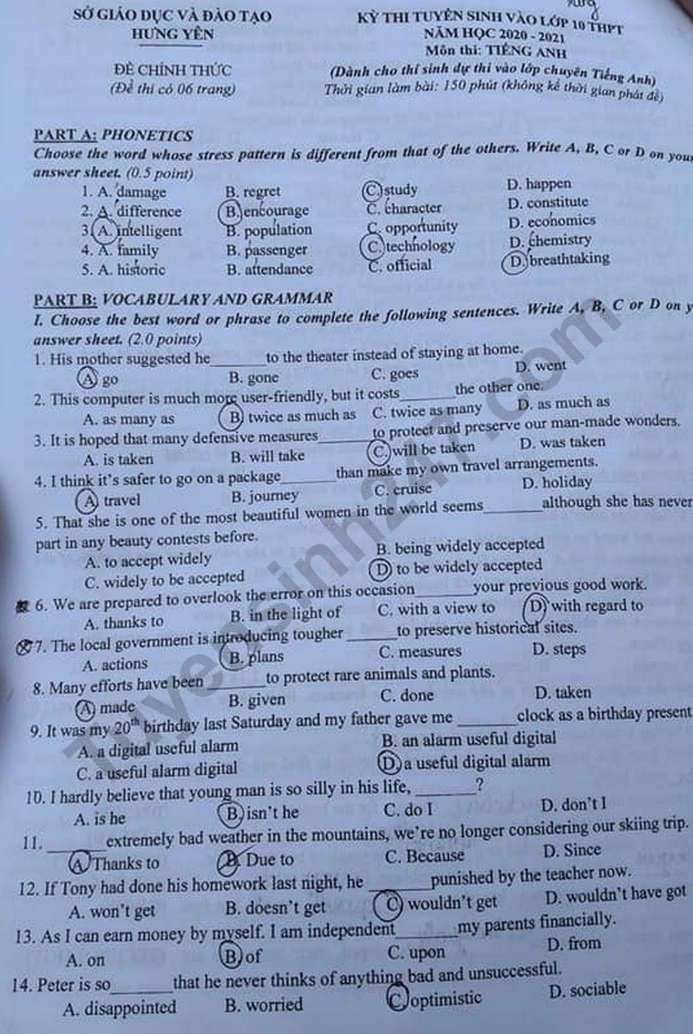
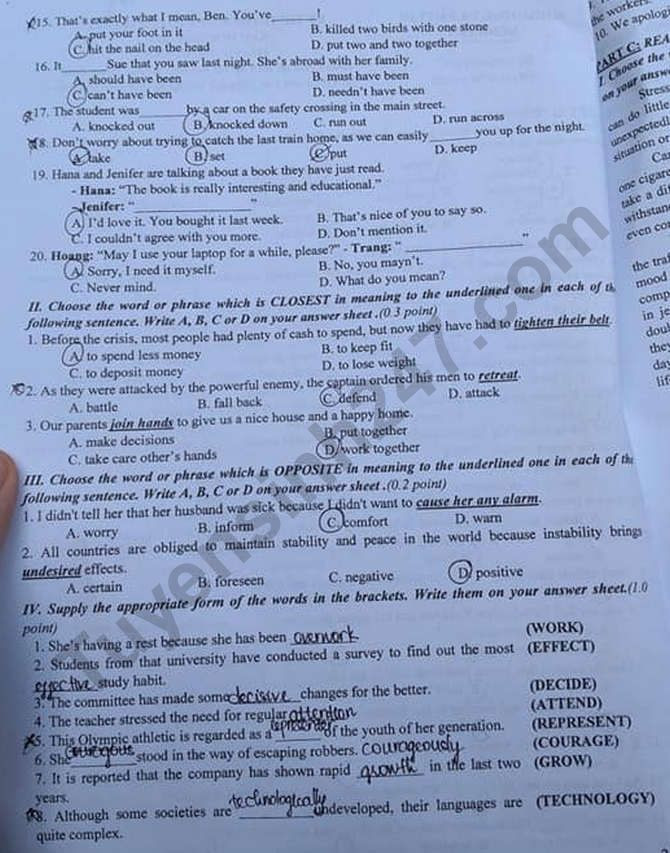
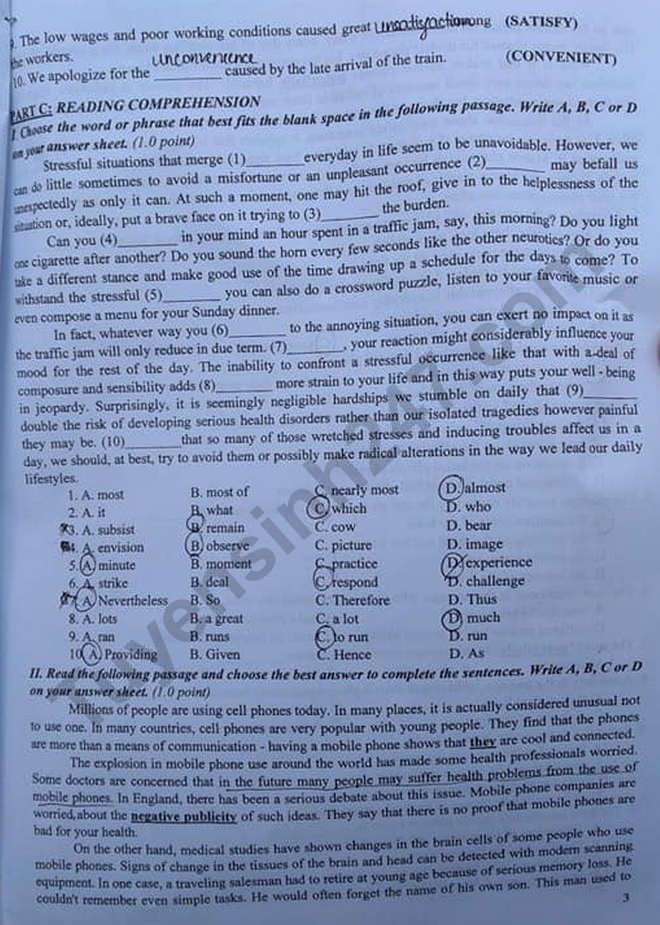
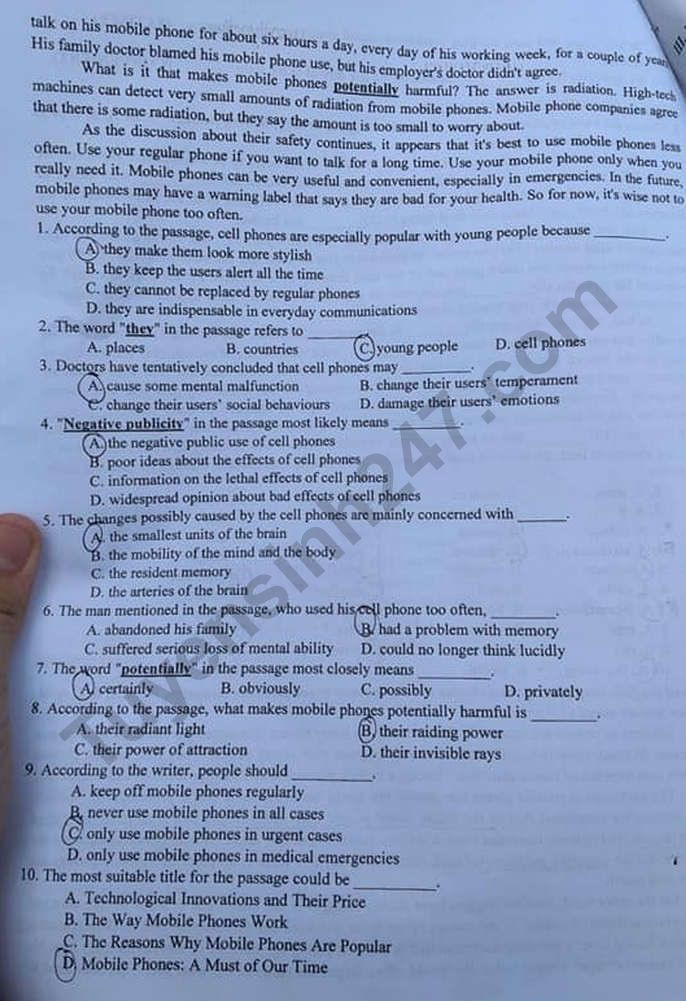
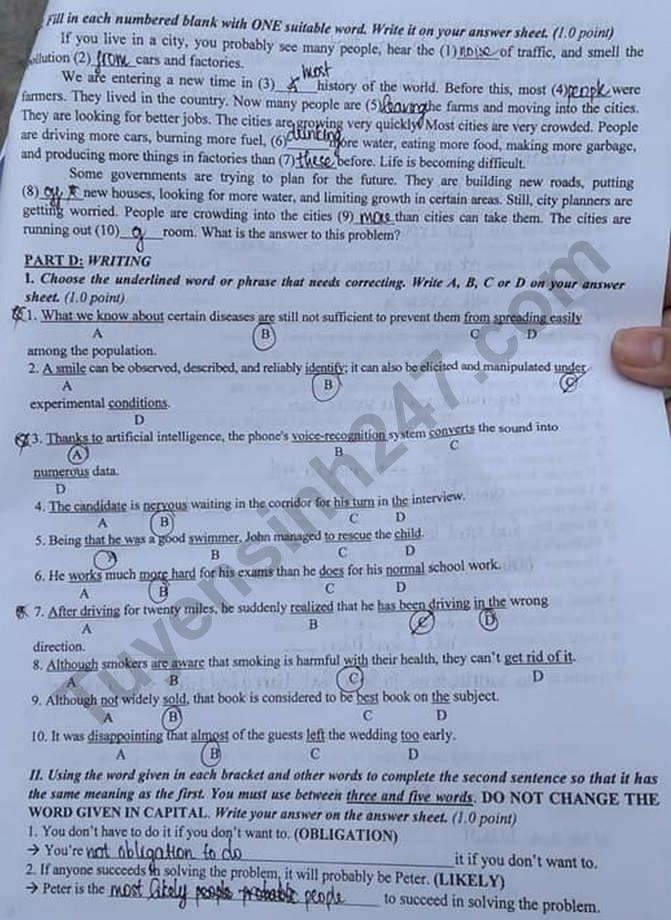
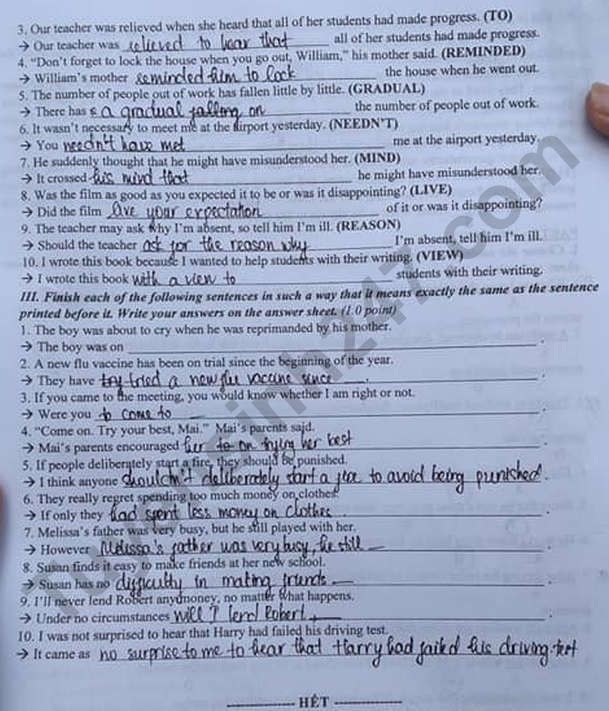
Xem thêm các chương trình khác:
